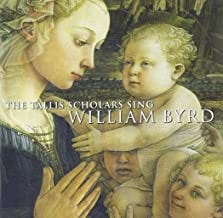We arrive at #4 of the top 50 greatest classical recordings of all-time, The Tallis Scholars Sing William Byrd. William Byrd was an English composer of the Renaissance period. Born in the 1540’s, Byrd eventually became a Roman Catholic and wrote Catholic sacred music from that point on. Although Byrd wrote choral, keyboard, and consort music, it is generally his choral music that he is most well-known. Byrd excelled at writing polyphony music, or music for two or more melodic lines. Byrd benefited from the ability to actually print his music, a privilege granted by the Crown.
By some more recent accounts, Byrd’s gradual movement toward Catholicism put him at serious odds with the Tudor authorities. He and his wife eventually appeared on the recusancy lists for refusing to attend Anglican services. Over time, Byrd increasingly found himself at odds with the Crown and often in the friendship of prominent Catholics. During this time, and thereafter, Byrd composed many motets and English songs. Between 1592 and 1595, Byrd began to set liturgical music for feasts of the Catholic Church, and he first composed settings for the Ordinary of the Mass in three voices, four voices, and five voices respectively. All three mass settings also employ a small choir to accompany the solo voices. Byrd’s masses are considered to be among his greatest works, and employ some dense harmonies and polyphony.
Byrd was certainly one of the most inventive and influential composers of the Renaissance, and he is revered in England as one of the greatest composers the country has ever produced. He is honored with a feast day in the Anglican Church.
On this collection, we find Byrd’s masses for three, four, and five voices as well as his oft- performed Ave Verum Corpus. The second disc contains an Anglican setting of The Great Service, as well as several motets. The collection is performed by The Tallis Scholars, one of the finest of British vocal ensembles. The Tallis Scholars, founded by Peter Phillips in 1973 after he invited several Oxford and Cambridge singers to join him, are known as one of the leading Renaissance groups in the world and are devoted to performing early music up through the Renaissance. Several members of the original group have gone on to have very successful solo careers in opera and oratorio.
In 1980, the group started Gimell, their own recording label. Gimell quickly gained a reputation for making exceptionally high-quality recordings with the Tallis Scholars. Byrd’s 3 Masses were recorded in 1984 in Merton College Chapel, Oxford. What sets this recording apart is the purity and blend of voices, and the pristine quality of the recording. Upon first hearing, it is astonishing how clear the voices are, and how they sound together. The different melodic lines are crystal clear, the distinct voices beautifully cut through the polyphony, and when the voices sing in harmonic unison the effect is positively spine-tingling. The beauty of the music comes through brilliantly, but it is also quite an impressive performance and production by all involved. That combination raises this recording to the top 50.
I will admit I don’t listen to Renaissance music very often, as I tend to prefer later classical periods. However, Byrd’s music never fails to move me, and this recording in particular pushes those buttons every time. I cannot imagine these pieces being performed any better, and the sacred nature of the works is fully honored. The Tallis Scholars have won many awards and accolades for their dozens of recordings, especially for their recordings of Allegri: Misere and for a later disc of Josquin’s Masses. But for me, this collection of William Byrd’s music will remain indispensable and something you really must hear. I would never want to be without it.
_____
"Gimell Records - 50 Greatest Recordings of All Time". Gimell.com. 2011-12-20. Archived from the original on 2013-12-12. Retrieved 2016-02-05.
"Gimell Records - News". Gimell.com. Retrieved 2016-02-05.
"The Tallis Scholars' and Gimell Records' 30th Anniversary: Peter Phillips and Steve Smith in conversation with John Quinn (JQ)". Musicweb-international.com. 1980-03-23. Retrieved 2016-02-05.
"William Byrd". Gramophone.
Boyd, M C (1962). Elizabethan Music and Musical Criticism. University of Pennsylvania Press.
Brown, A. and R. Turbet (1992). Byrd Studies. Cambridge.
Chisholm, Hugh, ed. (1911). "Byrd, William" . Encyclopædia Britannica (11th ed.). Cambridge University Press.
Fellowes, Edmund H. (1948). William Byrd (2nd ed.). London: Oxford University Press. ISBN 978-0193152045.
Harley, John (1997). William Byrd: Gentleman of the Chapel Royal. Aldershot.
Kerman, J. (1981). The Masses and Motets of William Byrd. London.
Kerman, Joseph. (2001). "Byrd, William". The New Grove Dictionary of Music and Musicians, second edition, edited by Stanley Sadie and John Tyrrell. London: Macmillan Publishers.
Knighton, Tess, and David Fallows. Companion to Medieval and Renaissance Music. New York: Schirmer Books, 1992, p. 34.
Libbey, Theodore. NPR Listener's Encyclopedia of Classical Music. New York: Workman Pub, 2006.
McCarthy, Kerry (2013). Byrd. Oxford University Press. ISBN 9780195388756.
McComb, Todd. "William Byrd". Classical Net.
Milsom, John. A Tallis Scholars' retrospective. Early Music, Volume 32, Number 3, August 2004, p. 466-468.
Monson, Craig (2004). "Byrd, William (1539x43–1623)". Oxford Dictionary of National Biography (online ed.). Oxford University Press. doi:10.1093/ref:odnb/4267. (Subscription or UK public library membership required.)
Phillips, Peter. English Sacred Music, 1549-1649. Oxford: Gimell, 1991.
Phillips, Peter. What We Really Do: The Tallis Scholars. London: Musical Times, 2003, p.143.
Sherman, Bernard D. Inside Early Music: Conversations with Performers. New York: Oxford University Press, 1997, p. 131.
The Tallis Scholars’ and Gimell Records’ 30th Anniversary: Peter Phillips and Steve Smith in conversation with John Quinn. MusicWeb International's Worldwide Concert and Opera Reviews. Accessed 9 December 2013.
Turbet, Richard (1987). William Byrd, A Guide to Research. New York: Garland. ISBN 9780824083885.
Turbet, Richard (2012). William Byrd: A Research and Information Guide (third ed.). New York: Routledge. ISBN 9780415875592. ISBN 9780203112342 (ebook)
Wilson, Nick. Art of Re-Enchantment:Making Early Music in the Modern Age. New York: Oxford University Press, 2013.


